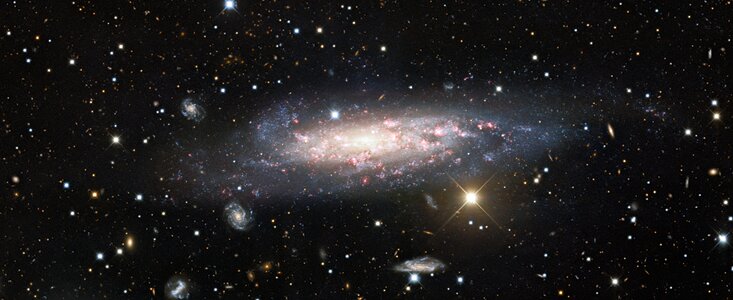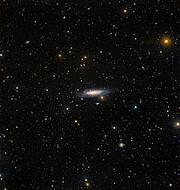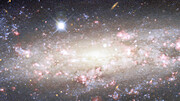Deep Dive into a Galaxy Cluster
Stunning deep image of NGC 1003 reveals hundreds of cluster galaxies
5 January 2021
A stunning long-exposure observation from the Kitt Peak National Observatory reveals the spiral galaxy NGC 1003 in glorious detail. The deep observation also shows a treasure trove of background galaxies spread throughout the image.
Astronomers refer to observations as “deep” when they are taken with very long exposure times. Just as with photography, this gathers more light, revealing distant, fainter objects. Deeper exposures let astronomers look deeper into the Universe — hence the name. This particular deep image was taken with a 70-minute exposure with the Nicholas U. Mayall 4-meter Telescope at Kitt Peak National Observatory, a Program of NSF’s NOIRLab, and captures the spiral galaxy NGC 1003.
NGC 1003 lies over 30 million light-years from Earth in the direction of the constellation Perseus. While it makes for a spectacular sight, it is only one of many galaxies captured in this image. Upon closer inspection, other galaxies can also be seen strewn throughout the image, with everything from delicate spiral galaxies to hundreds of fuzzy, red elliptical galaxies lurking in the background. The long exposure time of this deep observation — arguably the deepest image of NGC 1003 ever captured — allowed these usually overlooked background cluster galaxies to be captured in breathtaking detail.
Deep images such as this one have had an important role in shaping our understanding of the Universe. In 1995, the Hubble Space Telescope famously observed a tiny, nondescript patch of sky for 10 days to create the Hubble Deep Field. The observations revealed thousands of distinct galaxies, showing that our Universe is a surprisingly crowded place.
While the Hubble team deliberately avoided bright galaxies for their observation, this ground-based observation is littered with galaxies of all shapes and sizes — a spectacular backdrop for this portrait of NGC 1003. As well as revealing the host of background galaxies, the long exposure time of this observation allowed the researchers to capture the faint outer reaches of NGC 1003, which are threaded through with bright tendrils of stars. Equally eye-catching is the bright heart of the galaxy, which is surrounded by clouds of dense dust.
NGC 1003 resides in front of a galaxy cluster — a vast collection of galaxies bound together by gravity. These structures are among the most massive in the known Universe, and outweigh the Sun by a factor of a thousand trillion. Just as stars can be grouped into clusters, and these star clusters into galaxies, galaxies themselves form clusters and even superclusters — building up the large-scale structure of our Universe.
More information
NSF NOIRLab (National Optical-Infrared Astronomy Research Laboratory), the US center for ground-based optical-infrared astronomy, operates the international Gemini Observatory (a facility of NSF, NRC–Canada, ANID–Chile, MCTIC–Brazil, MINCyT–Argentina, and KASI–Republic of Korea), Kitt Peak National Observatory (KPNO), Cerro Tololo Inter-American Observatory (CTIO), the Community Science and Data Center (CSDC), and Vera C. Rubin Observatory (in cooperation with DOE’s SLAC National Accelerator Laboratory). It is managed by the Association of Universities for Research in Astronomy (AURA) under a cooperative agreement with NSF and is headquartered in Tucson, Arizona. The astronomical community is honored to have the opportunity to conduct astronomical research on Iolkam Du’ag (Kitt Peak) in Arizona, on Maunakea in Hawaiʻi, and on Cerro Tololo and Cerro Pachón in Chile. We recognize and acknowledge the very significant cultural role and reverence that these sites have to the Tohono O'odham Nation, to the Native Hawaiian community, and to the local communities in Chile, respectively.
Contacts
Amanda Kocz
Press and Internal Communications Officer
NSF NOIRLab
Cell: +1 520 318 8591
Email: amanda.kocz@noirlab.edu






